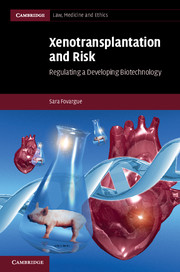Book contents
- Frontmatter
- Contents
- Acknowledgements
- 1 Introducing the issues
- 2 Dealing with risk
- 3 Regulating experimental procedures and medical research
- 4 Regulatory responses to developing biotechnologies
- 5 Challenges to legal and ethical norms: first-party consent and third parties at risk
- 6 Surveillance and monitoring: balancing public health and individual freedom
- 7 Summary and concluding thoughts: looking to the future
- Bibliography
- Index
1 - Introducing the issues
Published online by Cambridge University Press: 05 December 2011
- Frontmatter
- Contents
- Acknowledgements
- 1 Introducing the issues
- 2 Dealing with risk
- 3 Regulating experimental procedures and medical research
- 4 Regulatory responses to developing biotechnologies
- 5 Challenges to legal and ethical norms: first-party consent and third parties at risk
- 6 Surveillance and monitoring: balancing public health and individual freedom
- 7 Summary and concluding thoughts: looking to the future
- Bibliography
- Index
Summary
A day rarely passes without a media report which suggests that ‘miracle’ cures for some diseases and conditions are imminent. This ‘forward stampede’ which advocates new (bio)technologies may distract attention from other, less technological, problems and solutions and, to fulfil its promise, a developing biotechnology must move from pre-clinical to clinical trials. At this point, the relationships between science, ethics and law are brought into sharp focus. Xenotransplantation not only highlights these relationships but also the (ab)use of non-human animals. This is not my focus here; rather, I am concerned with whether and how xenotransplantation, a developing biotechnology which may benefit an individual but inherently risks harming others, can be accommodated within existing legal and ethical structures and conventions. What is at issue is how to appropriately reconcile private benefit with collective risk. The risks of xenotransplantation are such that it necessarily challenges accepted legal and ethical norms and existing regulatory structures may thus be ill-equipped to deal with it, but insufficient attention has been paid to these challenges by policy-makers and regulators to date. English law is my base but I draw on legal and ethical material from other jurisdictions where appropriate to explore how, if at all, the problems I identify have been addressed elsewhere. My analysis and discussions are thus not dependent on a legal system similar to England's; my concerns and questions are relevant across the world because of the global nature of the issues and risks raised by this biotechnology.
What is xenotransplantation?
In England xenotransplantation is defined as ‘any procedure that involves the transplantation, implantation, or infusion into a human recipient of either live tissues or organs retrieved from animals, or, human body fluids, cells, tissues or organs that have undergone ex vivo contact with live non-human animal cells, tissues or organs’. Work on this biotechnology has been motivated by the consistent gap between the demand for and supply of human organs available for transplantation. Pigs are currently the main focus as the source for these organs, and the hypothesis is that if pig organs are genetically engineered to minimise their rejection by humans, a never-ending supply of suitable organs, cells and tissues may be produced. The longest a human has survived with a non-human animal solid organ is nine months; however, this chimpanzee kidney was not genetically engineered and the viability of a genetically engineered pig organ in a human is unknown. Clinical cellular xenotransplants have been performed, but a clinical xenotransplant of a genetically engineered solid organ has yet to be reported. This is my focus.
- Type
- Chapter
- Information
- Xenotransplantation and RiskRegulating a Developing Biotechnology, pp. 1 - 13Publisher: Cambridge University PressPrint publication year: 2011



